- Home
- Susanna Kearsley
The Rose Garden Page 6
The Rose Garden Read online
Page 6
The repetition soothed me, and the sunlight caught my moving hand and glinted on the little golden Claddagh ring. ‘Aunt Claire.’
‘Yes?’
‘Can I ask you something?’
‘Certainly.’
‘When Uncle George died …’ No, that wasn’t right. I started over. ‘After Uncle George died, did your mind ever play tricks on you?’
‘What sort of tricks?’
‘Well, make you think you saw things that weren’t really there.’
She stopped digging with her trowel partway in the earth and glanced up again. ‘Are you seeing things?’
‘Sometimes. And hearing them.’
‘You mean the voices you heard in your room. Mark did mention that, yesterday.’
I mounded my basin with careful hands. ‘What, did he think I was losing my mind?
‘No, of course not.’ She gently pinched a dead and wilted bloom from the next plant before she set it in its hole. ‘Our bodies have a lot to deal with, darling, when we’re grieving. And in answer to your question, yes, my mind played tricks when I lost George. It still does, even now. I smell his aftershave, from time to time. It’s been five years this spring,’ she said, ‘and sometimes I still feel as though he’s very near.’ She looked directly at me then, and smiled a small and understanding smile. ‘Be patient, Eva. It will all get easier.’
I’d reached the final flower. ‘Yes, I know.’ Scoop, set it down, tamp, tamp.
‘There,’ said Claire with satisfaction, dusting off her hands against her legs as she stood to inspect our work.
I rose too, and for the first time took a good look at the sundial. The stone base had graceful curved lines and the vane on its top face that marked the sun’s passing was shaped like a butterfly pausing at rest with its wings folded upwards, set to cast its ever-moving shadows round a dial of Roman numerals raised in elegant relief. Around the whole top ran a poignant bit of poetry, in script:
The butterfly counts not months but moments,
And has time enough.
I traced the letters with one finger. Claire said, ‘That’s a lovely poem, don’t you think? By Rabindranath Tagore, I’ve always liked his poetry. Felicity outdid herself, I think.’
‘Felicity made this?’
‘It’s what she does,’ said Claire. ‘She’s quite a brilliant sculptress.’
‘Yes, she is.’
The bronze wing of the butterfly was casting its long shadow at the halfway point between the Roman numerals one and two, and Claire looked at her wristwatch to compare the times. ‘Bang on,’ she said. ‘There’s something to be said for the old ways.’ A breeze swept singing through the branches of the trees that marked the edges of the woods around us, and she raised her face to it. ‘I’ve always rather liked the Celtic view of life, that this world and the next one aren’t so separate from each other. My grandmother believed that. She was Welsh, you know – a true Celt, through and through – and if you’d told her you’d heard whispers in your walls, she would have taken it in her stride,’ she said, with certainty. ‘She would have said you’d heard the voices of the people living at Trelowarth, sharing space with us, but in another time.’
I thought that was a rather lovely concept, and I said as much.
‘I think so, too,’ said Claire. ‘So there, you see? Perhaps the voices you’ve been hearing aren’t imagined ones at all.’
‘You’re only saying that to make me feel less crazy.’
‘Is it working?’
‘Sort of.’ With a rueful smile I leant into the comfort of her one-armed hug, and told her, ‘Thank you.’
‘You’re most welcome.’
Turning, she looked back towards the patio, where Susan and Felicity were sitting with their heads bent close together over the old photos. ‘Haven’t you two finished laughing at my frocks, yet?’
‘Hardly.’ Susan called over. ‘We’re choosing a few to put up in the tea room.’
‘You do, and I’ll take them back down.’
‘Not of you,’ Susan said with a laugh. ‘Of the greenhouse. Like this one.’ She hefted the album, and rose and came over to show us.
‘Oh,’ Claire said. ‘Well yes, that one’s lovely.’
Looking at the picture of the greenhouse, with Claire’s mention of her grandmother still recent in my mind, I said to Susan, ‘Weren’t you going to ask Claire about the tea room where her grandparents met?’
‘So I was.’
Felicity, who’d come across to join us by the sundial, didn’t know the story, and asked Claire, ‘Your grandparents met in a tea room?’
‘They did.’
Susan prompted, ‘You have to tell the story, it’s romantic. Especially the part where your grandfather takes off his clothes.’
Claire smiled. ‘He did no such thing.’
‘He did. He took off his shirt.’
‘He was being a gentleman.’
Felicity found that amusing. ‘That’s what they all say.’
Claire went on, ‘It had started to rain, and my grandmother’s group – she had come down to Cornwall with some of her friends, from St Davids, in Wales – they got caught in it, soaked to the skin, so they ducked into the tea room to get warm. And my grandfather was working there that day, he was a plumber, and he saw her and was smitten.’
Susan picked up the tale. ‘So he went straight over to her table and whipped off his shirt, and―’
‘Nothing quite so dramatic.’ Claire’s wry glance was indulgent. ‘He saw that she was shivering, and offered her his own dry shirt. A gentleman,’ she said again. ‘Although, in fairness, Gran always suspected that he only did it to show off his chest. He was a well-built man.’
‘What was the name of the tea room?’ asked Susan.
‘The Cloutie Tree.’
Perfect for Cornwall, I thought. ‘Cloutie trees’ were a Celtic tradition, most often a thorn tree that grew by a holy well, on which the faithful tied ‘clouts’, bits of cloth they’d first dipped in the water, to take away sickness and wounds. As the cloth wore away to the elements, the ailment supposedly healed. There was one of these trees at St Non’s, in fact, not all that far from here, only the pilgrims who came to the holy well there were more likely to wish for things other than health when they tied their bright strips of cloth onto the tree. I’d once wished for a pony, myself, though I’d never received one.
‘The Cloutie Tree Tea Room.’ Susan tried the name herself, and seemed to like it. ‘I believe I’ll call mine that, as well. What do you think, Claire?’
Claire looked as though her thoughts were somewhere far away. I saw her pull them back again, and find a smile. ‘I think it would be lovely, Susan. Very fitting.’
She touched the sundial at her side with almost wistful fingers and then turned and went to put her tools away.
It struck me as I watched her walk across the wild back garden that Claire, like me, had lost her family young. Her grandparents, her parents – they’d have all been gone, as mine had now gone, by the time she reached her twenties, since according to my parents she had been alone when she had married Mark and Susan’s father. And except for Mark and Susan, she was now alone again.
It was the way of things, I thought. We never knew what time would bring us. Looking down, I watched the shadow shift a fraction on the sundial.
Counting, not by months, but moments, as the poem said. I almost envied that bronze butterfly, content to live completely in the present, unconcerned with what had gone before. What might have been.
The memory of Claire’s words of comfort rose again to fill my mind: Be patient, Eva. It will all get easier.
I hoped – I really hoped – that she was right.
CHAPTER SEVEN
The term ‘hallucination’, read the article I’d called up on the Internet, is applied to false perceptions made by any of the senses, though the ones that are most commonly involved are sight and hearing.
Shifting again in the chair at
Mark’s desk in the room that he used as his office, just off the back corridor, I settled in to keep reading. The article scrolled for what seemed like forever and slipped into language that probably only made sense to psychiatrists, but the subsection on ‘Auditory Hallucinations’ perfectly described the kind of voices I’d been hearing from my room. And while most people seeing things appeared to conjure non-existent people and not empty paths, it was still obvious to me that what I’d seen in the Wild Wood fit the criteria for ‘Visual Hallucinations’.
The causes, the article told me, were varied. If I ruled out schizophrenia, that left a list of others that included stress, depression and fatigue. And there were several medications that apparently induced hallucinations as a side-effect. Particularly sedatives.
I rummaged in my handbag on the floor beside the chair to find the sleeping pills I’d been prescribed, and entering the name on the computer searched for side-effects. Yes, there it was – right there in black and white: hallucinations.
I could feel myself relax. I wasn’t going mad at all, I thought, relieved. It was the pills, and nothing more. And if I didn’t take them any more, then that would be the end of it, because the detailed article explained hallucinations always stopped when one removed their cause.
Outside the office in the corridor I heard the back door open and the stamp of boots and scrabbling feet of dogs. I just had time to drop the pills back in my handbag and close down my search screens, returning to the colourful display of website templates I’d been looking at before, as Mark came in and asked me, ‘Any joy?’
‘I don’t know. Which one do you like?’
He arched an eyebrow warily. ‘I thought you said the website was for Susan.’
‘Well, she’ll be maintaining it,’ I said, ‘but it’s Trelowarth’s image that we’re putting out here, and you’ll want to have some say in that. Besides,’ I pointed out, ‘your blog will be from the same template.’
‘My blog?’
‘You’re the expert on Old Garden roses. Oh, come on.’ I smiled at his expression. ‘You’ll have fun. You’ll get to interact with all your customers.’
‘I do that now. They email me their orders and I fill them.’
‘Mr Sociable.’
‘And what exactly am I meant to blog about?’
I gave a shrug. ‘Whatever you get up to in the garden. Or the history of the roses. Or whatever strikes your fancy. It’s your blog.’
‘All right then, mastermind.’ He hitched a chair close to my own and sat. ‘You win.’ He scanned the templates. ‘That one’s not too bad.’
‘Good. That’s the one that Susan liked, as well. Now, let’s talk colours …’
Mark had always been a good sport. He endured another half an hour of website-planning torture with me before he began to fidget.
‘Never mind,’ I said. ‘I’ve got enough to start with. I can have this up and running for you in a week.’
‘A week.’ From the way he looked around I could tell that the prospect of having me taking up half his home office for that length of time gave him pause.
I reassured him, ‘I don’t have to work in here, if it’s a problem. I can use your extra printer and the laptop, on the kitchen table.’
‘No need for that. I tell you what,’ he said, ‘why don’t you use my dad’s old study? Set the printer and the laptop up in there, and you can work in peace. You won’t be tripping over all my mess.’
A good solution, really. Uncle George’s study was conveniently close to my own bedroom, and well across the landing from both Mark and Susan’s rooms, so I could work late if I wanted without worrying I’d keep them up. And working late was how I got myself through those first nights without the sleeping pills, which I had safely buried at the bottom of a drawer.
I was, if nothing else, productive in my work. I had the website done within a week, as promised, and when Wednesday rolled around again I’d finished with the final bits of testing, and was drifting off to sleep at night without the aid of anything, and feeling more myself.
And very ready for a change of scene. It had been raining off and on for the past week, and so I hadn’t really minded being cloistered in the study, but stepping out the back door now I found the morning bright and fresh and sunny, with a clean wind off the sea that swept the calling gulls along with it and cleared my cobwebbed mind.
The dogs came bounding up to greet me and raced off again to be with Mark, wherever he was working in the gardens. I considered going after them, but knew I wouldn’t be much help to Mark, I’d only slow him down. Besides, now that I had the website done, I needed to discuss the next steps in our new promotion plan, and that meant finding Susan.
She was in the greenhouse with Felicity, standing just inside the door and staring at the plumber who’d arrived a few minutes before, sent by Andrews & Son from St Non’s to inspect the old plumbing and give her a quote for the work to be done. I couldn’t help but stare a bit myself – he was a decidedly well-built young man, so much so that Felicity, watching him study the pipes, nudged her friend and said, ‘Well done you. Recreating the past with precision, aren’t you?’
Susan asked, ‘What?’
‘Recreating Claire’s Cloutie Tree Tea Room, right down to the good-looking plumber. I’d like to see him take his shirt off.’
‘Fee!’
‘What? He can’t hear us. God, will you just look at that.’
I looked too, and smiled a little as the plumber, seemingly completely unaware he had an audience, reached up to test the soundness of an overhead joint in the piping, a movement that showed off his broad muscled chest.
‘What’s his name?’ asked Felicity.
Susan, equally awed, shook her head. ‘I don’t know. They just sent him.’
‘Well, they’ve got my business.’
I smiled even more at Felicity’s tone, but it didn’t convince me. She’d been up to Trelowarth a few times this past week, enough for me to come to the conclusion that Felicity, for all her talk, was already quite hopelessly infatuated.
Mark, of course, had no idea. I could see how Felicity looked at him when he came into a room, and the way that she constantly watched him, the light in her smile when he spoke to her. But men could be so impossibly blind, I thought, just as the plumber was blind to the fact we were all of us watching him now.
‘Perhaps I ought to see if he has any questions,’ Susan said, all innocence, then spoilt it with a wink and crossed the greenhouse with a more purposely feminine walk than her usual breezy stride.
Felicity watched her friend go with approval. To me, she said, ‘It’s good to see her taking an interest in men again, after the last one.’
After Susan’s sharp reaction to my mention of her time in Bristol, I hadn’t pried further, but I felt safe in asking Felicity now, ‘Was he awful?’
‘Not at all. But he was older. Much older than Sue, and that made things quite difficult, sometimes. She didn’t really fit in with his friends, and he didn’t fit in with hers, and … well, they came from different generations, different worlds, and sometimes that’s a gap that can’t be bridged. I know she tried. It was your sister’s death,’ she told me, ‘that decided things, I think. Sue said it made her realise life was just too short, so she came home.’ She glanced at me confidingly. ‘Your sister’s death affected everyone round here. It was a blow.’
‘To me as well.’
I liked the way Felicity accepted that, not leaping in with platitudes. ‘Was she your only sister?’
‘Yes.’
‘I can’t imagine. Me, I’ve got three sisters and two brothers. Breed like rabbits, we do. Every time I go home for a visit it seems that I’ve got a new nephew or niece.’
‘Where’s home?’ I asked her.
‘Somerset.’
It surprised me she wasn’t from Cornwall. She looked Cornish enough, with her dark hair and eyes and her small, tidy figure set off to advantage in jeans and a form-fitting shirt and th
e gypsy-like scarf that today bound her curls in a long swinging ponytail. She’d picked up a bit of the accent as well, the distinctive and musical cadence of West Country speech, and I wouldn’t have known that she wasn’t a native.
‘It’s not all that far away, really,’ she told me, ‘though when I first came down here it seemed like a different world, like I had crossed some great divide.’
‘You did,’ I said. ‘You crossed the Tamar.’ And I told her what my mother had told me about the crossing of the river Tamar and how it affected those with Cornish blood.
‘Well, I must have an ancestor from Cornwall then,’ she said, ‘because I definitely felt it. I was on a summer holiday with friends, and I had one more year to finish uni, and all that time the only thing I thought about was how to get back here. And in the end I just packed up and came. No plans. My parents thought I’d gone completely mad. They still do,’ she said, ‘but they’ve given up trying to cure me. I’ve told them, it’s Cornwall. There’s no way to fight it.’
I knew what she meant. There was something about this remote western corner of Britain that captured the soul and refused to let go, something ancient and wild in the moors and black cliffs and the voice of the sea that spoke always of something unseen and enchanted.
Felicity tried to express it in words. ‘In Cornwall,’ she told me, ‘one truly feels magic could actually happen.’
I thought of those words as I walked down The Hill after lunch on my way to the bank in Polgelly. There was no one but me on the road. Which was just as well, really, since there would have been little room for a car to push past me, especially once I got under the shady green canopy of the arched trees, with the steeply-banked hedges of stone, turf and tangled growth rising to block out my view of the fields at both sides. As the breeze shook the leaves overhead I remembered the strong sense of magic I’d felt here myself, as a child.

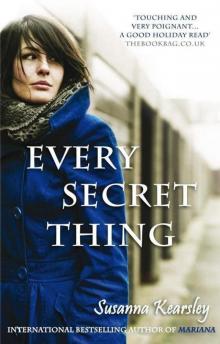 Every Secret Thing
Every Secret Thing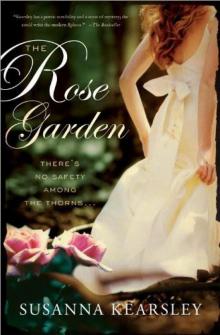 The Rose Garden
The Rose Garden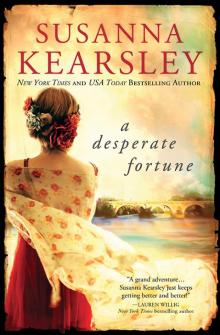 A Desperate Fortune
A Desperate Fortune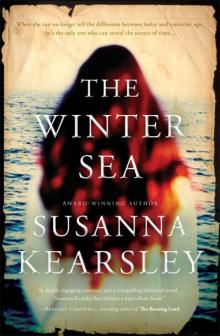 The Winter Sea
The Winter Sea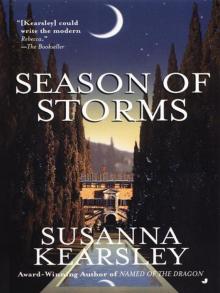 Season of Storms
Season of Storms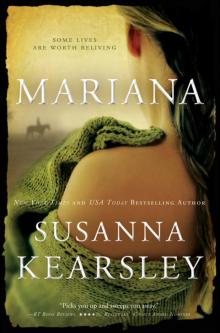 Mariana
Mariana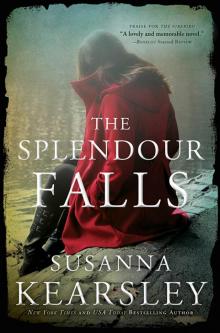 The Splendour Falls
The Splendour Falls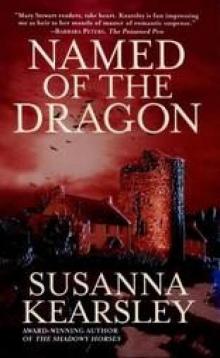 Named of the Dragon
Named of the Dragon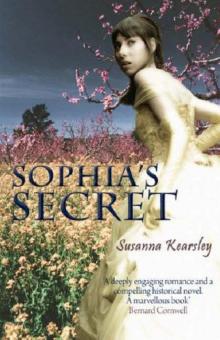 Sophia's Secret
Sophia's Secret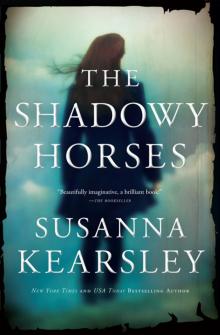 The Shadowy Horses
The Shadowy Horses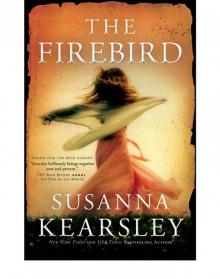 The Firebird
The Firebird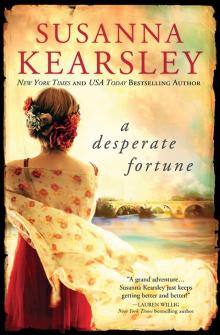 Desperate Fortune
Desperate Fortune